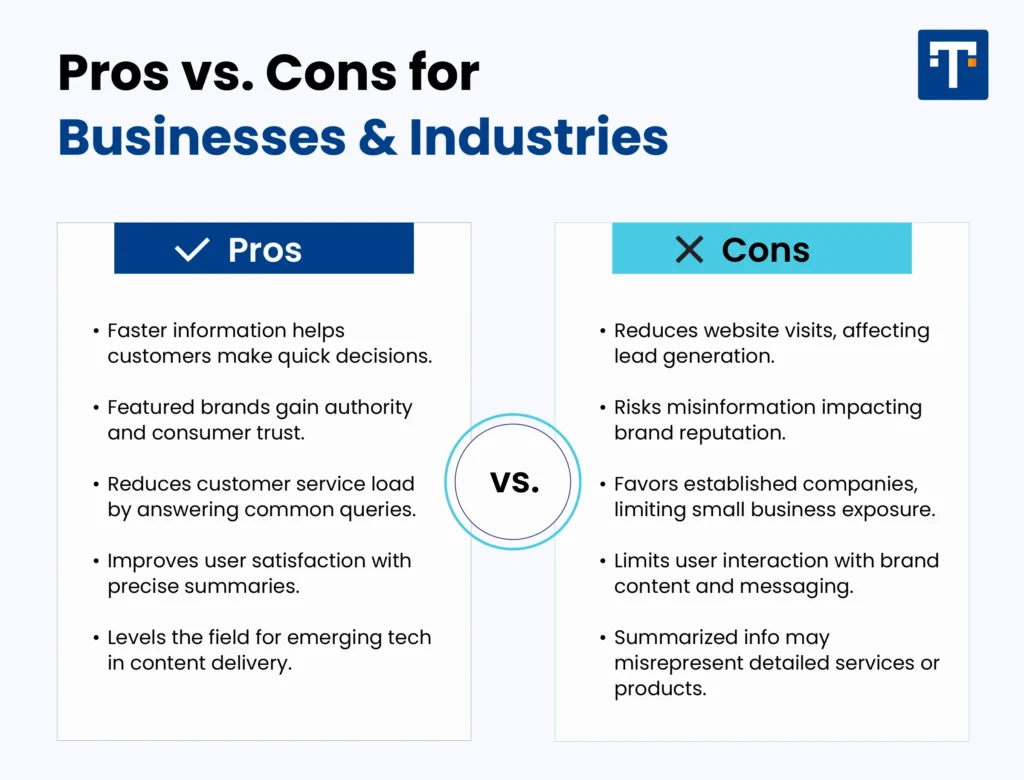Necessary Always Active
Necessary cookies are required to enable the basic features of this site, such as providing secure log-in or adjusting your consent preferences. These cookies do not store any personally identifiable data.
|
||||||
|
||||||
|
||||||
|

Google AI Overview is a feature powered by Google’s Gemini, designed to provide quick and realistic answers directly in search results, similar to how ChatGPT functions. This latest AI powered technology appears in Google search results based on available data in response to user queries.
Before the introduction of Google AI overviews, users would enter a search query into Google and receive a ranked list of web pages. They would then browse through these links to find the information they needed.
Until recently, Artificial general intelligence has significantly changed the way websites and content are created and viewed. In an interview, Elizabeth Reid, Google’s head of Google search stated that AI Overviews are designed to offer users concise, AI-generated summaries directly in search results. This aims to deliver higher-quality clicks by providing immediate, relevant information that addresses user’s queries.
However, recent studies suggest that the introduction of AI Overviews correlates with a measurable decline up to 34.5% in organic visibility, particularly for top-ranking and non-branded keywords.
In this article, we explore the impact of Google AI overviews on business growth highlighting its impact on search behavior and SEO.
Google AI overview was introduced to replace the Search Generative Experience (SGE). It is a feature that displays a holistic summary of your search query at the top of your search engine results page (SERP) before listing the relevant pages.
You might be wondering how Google AI Overview works?
Whenever a user submits a query, Google utilises advanced large language models (LLMs) such as Google Gemini to analyze the intent and context. Thereafter, relevant summaries are generated in response to user queries which are constructed by aggregating vital information from multiple sources.
Nowadays, people simply Google anything they are looking for on the most popular search engine. With the impact of AI over the years, a simple Google search provides access to a breakdown of information that summarizes your search intent based on available data.
Hence, AI generated summaries include:
1. A short paragraph and more detailed information about the search query in bullet.
2. A link is provided which directs readers to where the resource was generated from.
3. An indicator showing that the content is AI generated.
One impact of Google’s AI Overview on customer behavior is that it provides quick, direct answers for users seeking simple information. As a result, users are less likely to click through to individual websites, leading to a decline in organic traffic for businesses.
This trend affects the growth of startups and niche service providers that rely on website visits to build brand recognition and customer engagement.
One of the strengths of Google AI overview is that it is comparable to Google featured snippets which also utilize AI to generate key information from top ranking web contents.
While AI Overviews aim to provide accurate information based on available data online, instances of misinformation have been documented. In 2024, Google took extra steps to fix Google AI overview feature issues.
For example, there have been cases where AI-generated summaries produced misleading or incorrect information, such as suggesting users add glue to pizza or consume inedible substances like rocks. In critical fields like healthcare and finance, such inaccuracies can lead to misguided decisions with serious consequences.
The potential for AI to “hallucinate” or generate plausible-sounding but incorrect information underscores the need for users to verify AI-generated content with authoritative sources.
Small businesses face significant hurdles due to AI Overviews favoring content from well-established sources. This preference diminishes the visibility of lesser-known companies, making it challenging for them to compete for attention in search results.
The decreased organic traffic necessitates increased reliance on paid advertising, straining the limited marketing budgets of small enterprises and potentially impeding their growth and sustainability.

AI systems are susceptible to biases present in their training data, which can result in skewed search outcomes. For instance, studies have shown that search algorithms can perpetuate existing societal biases, affecting the representation of different groups.
Such biases in AI Overviews can mislead users and reinforce stereotypes, highlighting the necessity for ongoing monitoring and refinement of AI algorithms to promote fairness and accuracy.
The prominence of AI Overviews in search results can overshadow individual brands, as users may obtain the information they need without visiting the source websites. This reduction in direct engagement poses challenges for businesses in building brand recognition and customer relationships. To mitigate this, companies must adapt their digital marketing strategies to emphasize unique content and leverage alternative channels for audience engagement.
While Google AI Overviews represent a significant advancement in information retrieval, they introduce complexities that can adversely affect business growth. The challenges of reduced website traffic, potential misinformation, and diminished brand visibility necessitate that businesses proactively adapt their strategies.
Furthermore, OpenAI’s introduction of SearchGPT is challenging Google’s dominance in the search engine market. This development comes shortly after Google’s rollout of AI Overviews, an AI-powered feature designed to enhance search results by providing summarized information directly within the search interface.
The emergence of SearchGPT introduces significant competition, potentially reshaping the landscape of online search by offering users an alternative platform for information retrieval.
Emphasizing content quality, diversifying marketing approaches, and advocating for transparent and equitable AI practices are essential steps for businesses to thrive in this evolving digital environment.
Sign up to receive our newsletter featuring the latest tech trends, in-depth articles, and exclusive insights. Stay ahead of the curve!